Accelerated Tech
Networking
3D Printing
Accelerated Tech
Networking
3D Printing
X1Plus Expander is the hardware companion to the X1Plus open-source custom firmware distribution for Bambu Lab’s X1 3D printers. It extends your printer’s functionality with an Ethernet port, two USB ports, a STEMMA-compatible I²C connector, and four interchangeable GPIO headers for expansion modules.
X1Plus Expander is a compact, easy-to-use solution whether you’re a print farmer in search of reliable connectivity and a status indicator, a Home Assistant power user looking to integrate environmental sensors, a content creator who needs to automate high-quality photography, or just someone who wants a little more LED bling on and around their printer (for reasons either practical or aesthetic).
X1Plus Expander plugs into your X1 between the AP board and the chamber-monitoring camera. It hosts a Microchip LAN9514 that operates as a USB hub, a 100-megabit Ethernet controller, and a Raspberry Pi RP2040 to handle GPIO controls. It also includes voltage regulators to step down from the printer’s main 24 V power supply, providing reliable 5 V and 3.3 V power without loading the AP’s regulators.
X1Plus Expander tucks away behind the X1’s LCD screen in an enclosure that you can print yourself. If you would rather get started right out of the box, you can order a high-quality print of the enclosure from us. X1Plus Expander has four expansion headers on the top for add-on modules.
We’ve made several add-on modules available for X1Plus Expander:
To support the new capabilities of X1Plus Expander, we’ve designed a first-class Actions subsystem into the X1Plus firmware. X1Plus Actions connect many different triggers in the printer to perform chains of commands. For instance, you could…
The possibilities are endless! And if you need a feature that’s not currently available in the X1Plus system, actions and triggers are defined in the open-source X1Plus Daemon, which is written in Python, so you can add your own actions or interface with whatever hardware module you might dream up.
We are initially offering three modules for X1Plus Expander, and of course you’ll have that I²C interface as well. Beyond that, each module interface is wide-open with eight GPIOs. If you want to attach other peripherals to your printer, you can hook them up with 0.1 inch jumper cables or you can fab out a board with a keyed 16-pin connector if you need a reliable interface. X1Plus Expander also looks for an I²C EEPROM on pins 6 and 7 of each interface to automagically detect what module is attached to each port on boot. Each GPIO port has:
X1Plus Expander ships with an RP2040 firmware that supports I²C and WS2812B-compatible LED strips on specific pins and GPIO on all pins. But, like everything else in the X1Plus ecosystem, that firmware is open source, so you can modify it to suit your needs. (Or, better yet, so you can submit a patch and improve X1Plus for the rest of us!)
| X1Plus Expander | BLLEDController | DIY Linux system + Home Assistant | Bambu Lab OEM Extension Box | |
|---|---|---|---|---|
| Manufacturer | Accelerated Tech & X1Plus | DutchDeveloper | DIY | Bambu Lab |
| Connectivity | Ethernet + Wi-Fi + offline | Requires Wi-Fi | Requires Wi-Fi | Wi-Fi + offline |
| Modular add-on system | Yes | No | DIY | No |
| LED support | With optional module | Built in | Depends on SBC support | Built in |
| LED colors | Programmable, full-color WS2812B strips | Single-color LED strips | Depends on SBC support | Single-color LED strips |
| GPIO control | Yes | No | Depends on SBC support | Yes |
| I²C interface | Yes | No | Depends on SBC support | No |
| Camera shutter | With optional module | No | No | Built in |
| Power supply | Integrated | External | External | Integrated |
| Installation complexity | Moderate | Moderate | High | Low |
| Requires modified firmware | Yes ¹ | No | No | No |
| Compatibility with other services | Requires integration SW | None | Wide ecosystem | None |
| Open source | HW + FW + SW | FW only | SW only | No |
| Approved by Peanut the cat | Ping-pong ball hidden on silkscreen | Untested | Peanut uninterested | Peanut still waiting |
| Price & availability | $131 | $32-$40 | ~$100 | Unreleased |
¹ Works in conjunction with the X1Plus custom firmware, which requires rooting your printer
The X1Plus firmware modifications for the X1 are open source software that you can easily install on your X1. X1Plus Expander and its modules are open hardware, developed on GitHub and designed with KiCad.
The CAD files for X1Plus Expander’s mount were designed in OnShape. Exports of the STEP files used to build it are available in the X1Plus Expander GitHub repository.
If you’d like to follow along with the ongoing development of X1Plus Expander, we’ll provide plenty of updates through this campaign. But if you’d like to see the nitty-gritty details of how it’s all coming together, be sure to check out our Hackaday project page! You can read about X1Plus itself on the X1Plus Wiki, and you can join a vibrant community chatting about X1Plus (and all sorts of other Bambu-related topics) on Discord.
X1Plus Expander consists of three classes of components:
The X1Plus Expander main board and modules. To reduce cost, these PCBs are designed around the manufacturing and sourcing capabilities of common Shenzhen-ecosystem hardware manufacturers. So far, we have three quotes from three different fabrication and assembly houses, all of which are confident they can easily source our BoM. We will select a vendor based on volume, but all three options have handled manufacturing for past Crowd Supply campaigns, and we have heard good things about each of them from previous Crowd Supply creators (some of whom have offered additional advice on how to achieve the best possible results from these CMs).
The wiring harness. Our prototype wiring harness was manufactured at LCSC, but there are a number of other well qualified vendors out there. Based on referrals from other Crowd Supply creators, we believe some of the other vendors might be able to produce a wiring harness that feels slightly nicer in the hand, so we’re still investigating. And, if we don’t find anything better, we already have a pile of 50 perfectly capable wiring harnesses, and LCSC is eager to make more for us.
Plastics, boxes, and labels. Creators often take these things for granted, but they still cost money and take time. Suffice to say, they are on our checklist. For backers who want a "ready-to-install" unit, we are offering a high-quality printed (either SLS or SLA) enclosure. We’ve identified a few vendors who can produce a decent-looking mailer box, as well. Our hope—and, better yet, our best estimate after receiving various quotes—is that we should have assembled PCBs here in California within a few months of the campaign’s successful conclusion. Once everything arrives, Peanut and I will perform final functional testing here, using our custom test fixture (which is is itself open source, naturally).
After each board is tested, we’ll tuck it into a box, label that box, place it into a bigger box with several of its friends, add a few more labels, and send it all along to Crowd Supply’s fulfillment partner, Mouser Electronics, who will handle distribution to backers worldwide. This arrangement lets us ship your goodies much faster than we could on our own.
You can learn more about Crowd Supply’s fulfillment service under Ordering, Paying, and Shipping in their guide.
X1Plus Expander relies on a combination of open source software and Bambu Lab’s proprietary firmware. Because X1Plus is maintained by volunteers, we’re not in a position to guarantee software updates forever, but I’m committed to providing ongoing support at least for the firmware that ships with X1Plus Expander and the features described in this project page: Ethernet connectivity, some I²C peripherals, LED strips, the andon board, and the shutter-release module. Our hope, of course, is that we’ll be able to continue supporting X1Plus long into the future.
This is not my first manufacturing effort. I have personally worked in new-product introduction for various clients, most of which are consumer electronics providers. It is, however, the first time I will be leading such an effort on my own. I’ve seen plenty of manufacturing chaos, even (especially!) around those who ought to know better, and I have no doubt that I’ll experience some myself. Surprises are inevitable, but I’ve taken steps to mitigate risks and prevent unexpected developments from derailing our delivery schedule.
A design that reduces complexity. Much of X1Plus Expander’s behavior is defined by the software running on the X1, and on the RP2040, which allows the hardware to remain pretty simple. The RP2040 is surely one of the best characterized modern-day microcontrollers, and the LAN9514 is widely deployed (including on the Raspberry Pi 3). The components that make up X1Plus Expander are mature, popular, and readily available from US distributors.
Highly manageable volume. I’m building this product because I want to give more people the ability to do exciting things with their printers, and I wouldn’t mind motivating more users to contribute back to X1Plus. I do not expect to break any crowdfunding records, and that’s OK. At the scale I anticipate, any setbacks that might occur are unlikely to require a redesign or a follow-up manufacturing run. At worst, I’ll put in some manual labor, learn some new lessons, and update my checklist for next time.
Extremely knowledgeable folks watching over my shoulder. Any mistakes I might make will be my own, so I won’t name the people I’ve been working with, but I have spent a lot of time trying to glean what I can from those who’ve traveled this road before. That includes previous Crowd Supply creators as well as the folks at Crowd Supply themselves. This platform is a little more expensive than some of the alternatives, but I’m happy to pay for what I see as a much higher probability that I’ll ship on schedule.
There’s a lot that can go wrong when manufacturing electronic products, but I’ve worked on enough other projects—and run the numbers on this one often enough—to know that it would take a pretty catastrophic outcome to put me in the red. All of which is to say, I have a plan for how this is going to happen, and I think that plan is a good one. And sure, "everybody has a plan until they get punched in the mouth," but, at the end of the day, I’m in this to ship.
I’ve written plenty about the development of this project, and I plan to keep doing so. If everything goes great (and I hope it does!), I’ll write about that. And if something goes off the rails, you can bet that I’ll tell you all about it while I work out a solution.
This project would not have been possible without help from a great many people. Thanks in particular to Nixiebunny, who drove much of the hardware effort for X1Plus Expander’s add-in modules, pushed for prototype manufacturing, co-designed the main Expander board, and generally made sure that this project came together. Thanks (in no particular order) to Jon, Doridian, Balázs Triszka, crc32, Riptide, Wolf on Air, and Wolf with Sword, for their invaluable contributions to the X1Plus software; to the poor Crowd Supply project managers who had to edit my engineer writing; and to the myriad other creators who have contributed their time to answer my trivial questions. I would also like to express my gratitude to everyone in wider the X1Plus community, which made this project worth the effort! The lovely music in the campaign video is "Yellow", by Scott Buckley, released under the Creative Commons CC-BY 4.0 license. Finally, as you’ve probably figured out, X1Plus is not affiliated with or endorsed by Bambu Lab. They have not tested X1Plus Expander for compatibility with any particular printer, nor have they approved or authorized these modifications in any way.
"If you love your Bambu Lab X1 3D printer and the open source philosophy, then the X1Plus Expansion Board is perfect for you."
"[W]hat if you could take your 3D printing experience to the next level, expanding its potential with additional sensors, lights, cameras, and more? Enter the X1Plus Expander, the latest hardware companion for the Bambu Lab X1 series..."
"Just when you thought the Bambu Lab X1’s custom firmware couldn’t get any more custom, the team behind it, Accelerated Tech, goes and drops the X1Plus Expander."
"[T]he X1Plus Expander makes the Bambu Lab X1C almost perfect in terms of hardware."
Produced by Accelerated Tech in Mountain View, CA and Cambridge, MA.
Sold and shipped by Crowd Supply.
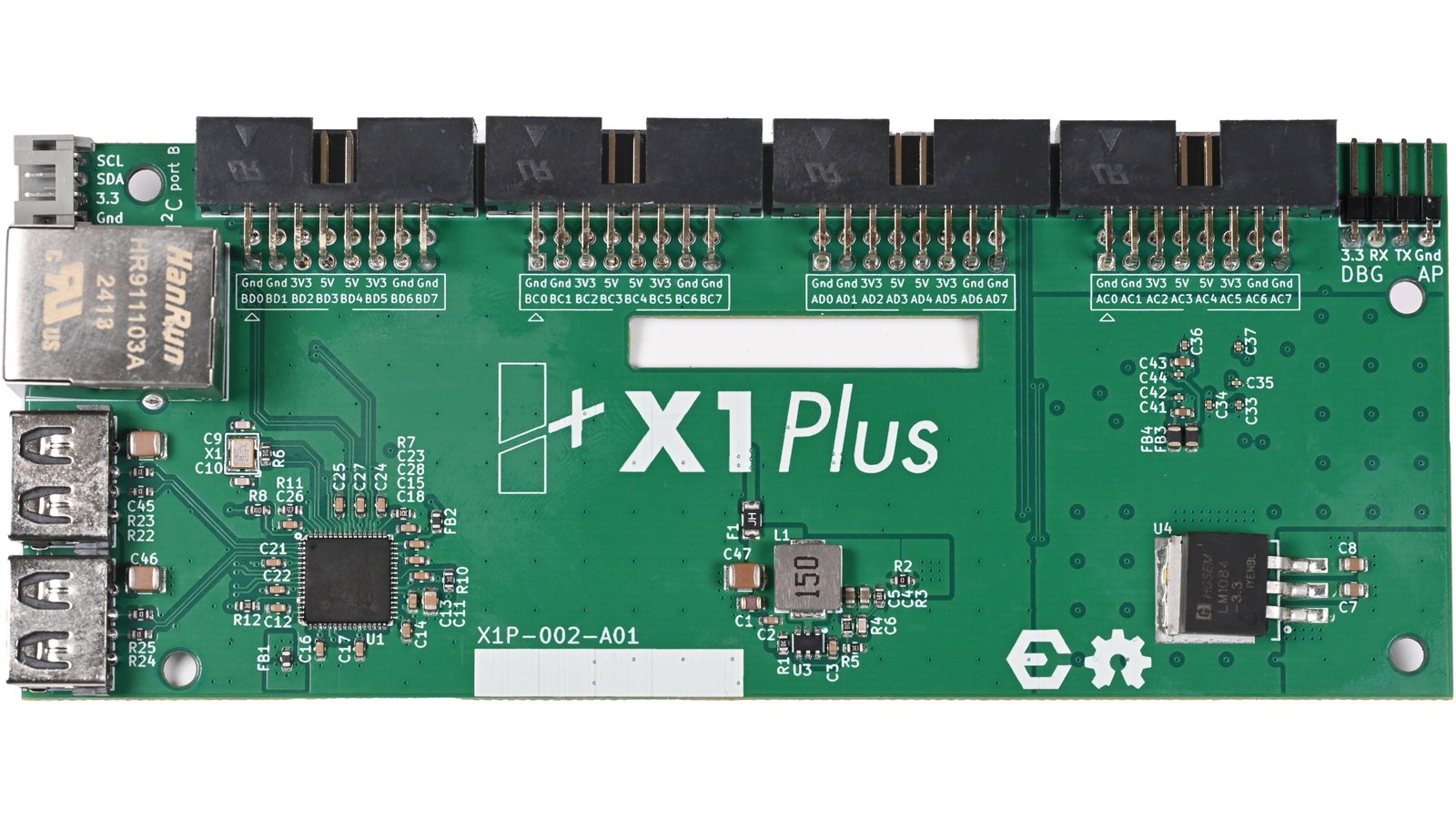
An expansion kit for the Bambu Lab X1 Carbon printer. Includes an Ethernet port, two USB ports, and four GPIO ports. Comes with a wiring harness and four mounting screws for use with our enclosure design.
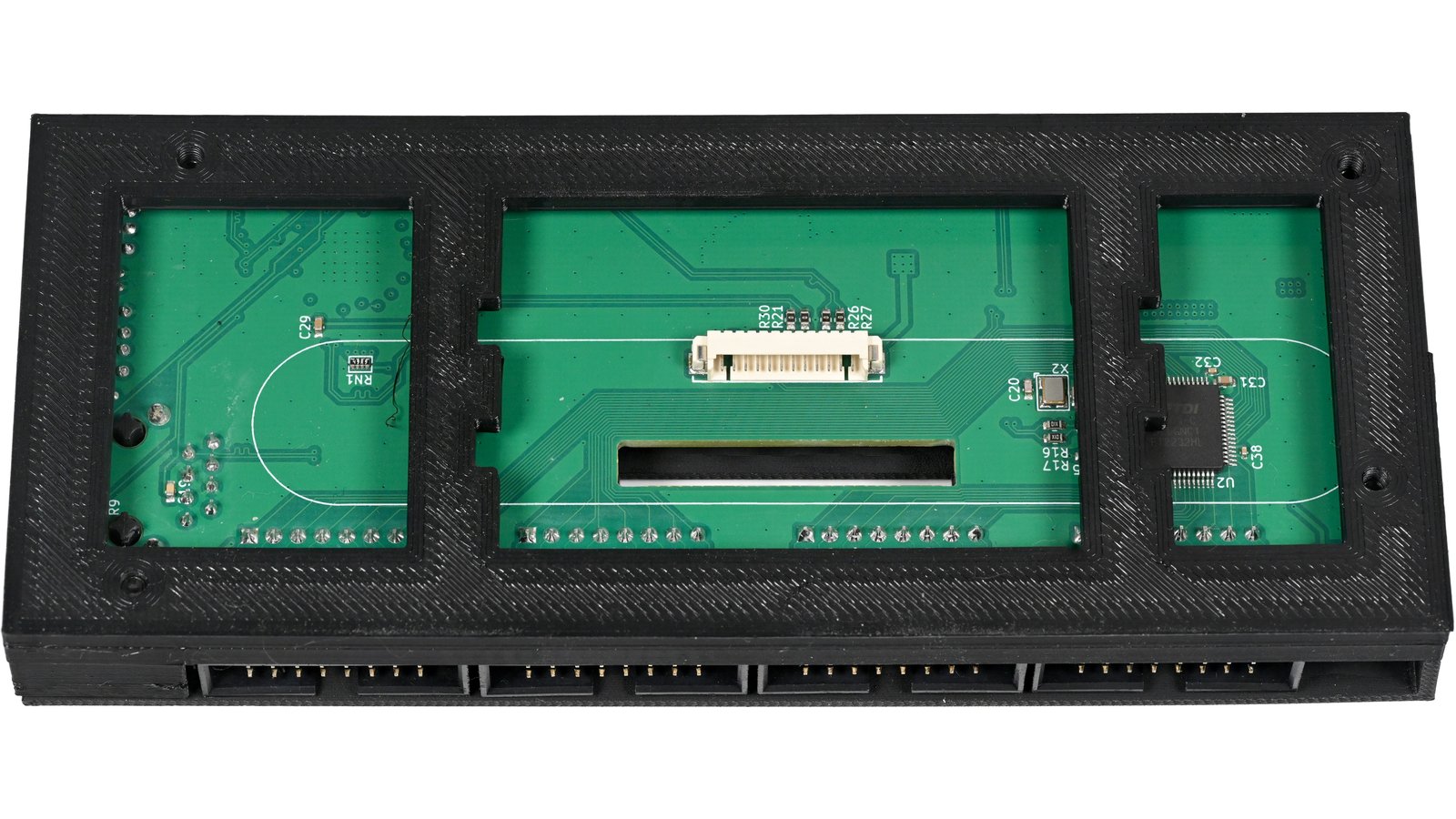
An SLS-printed nylon enclosure with a bracket that tucks your X1Plus Expander neatly behind the LCD at the front of a Bambu Lab X1 Carbon printer. Requires X1Plus Expander
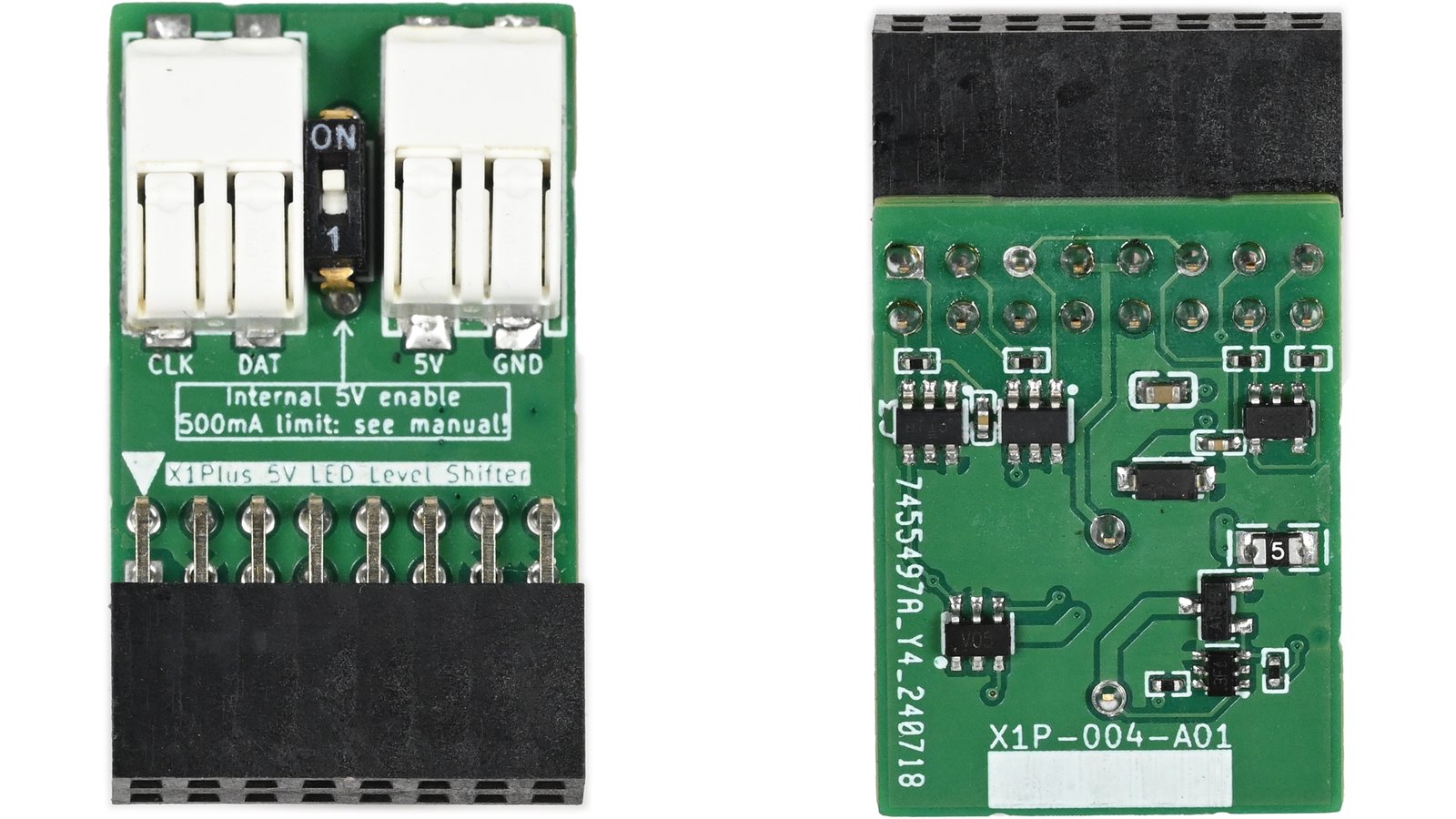
A module for X1Plus Expander with a level shifter that can drive a string of WS2812B-compatible LEDs such as Adafruit Neopixels. Requires X1Plus Expander
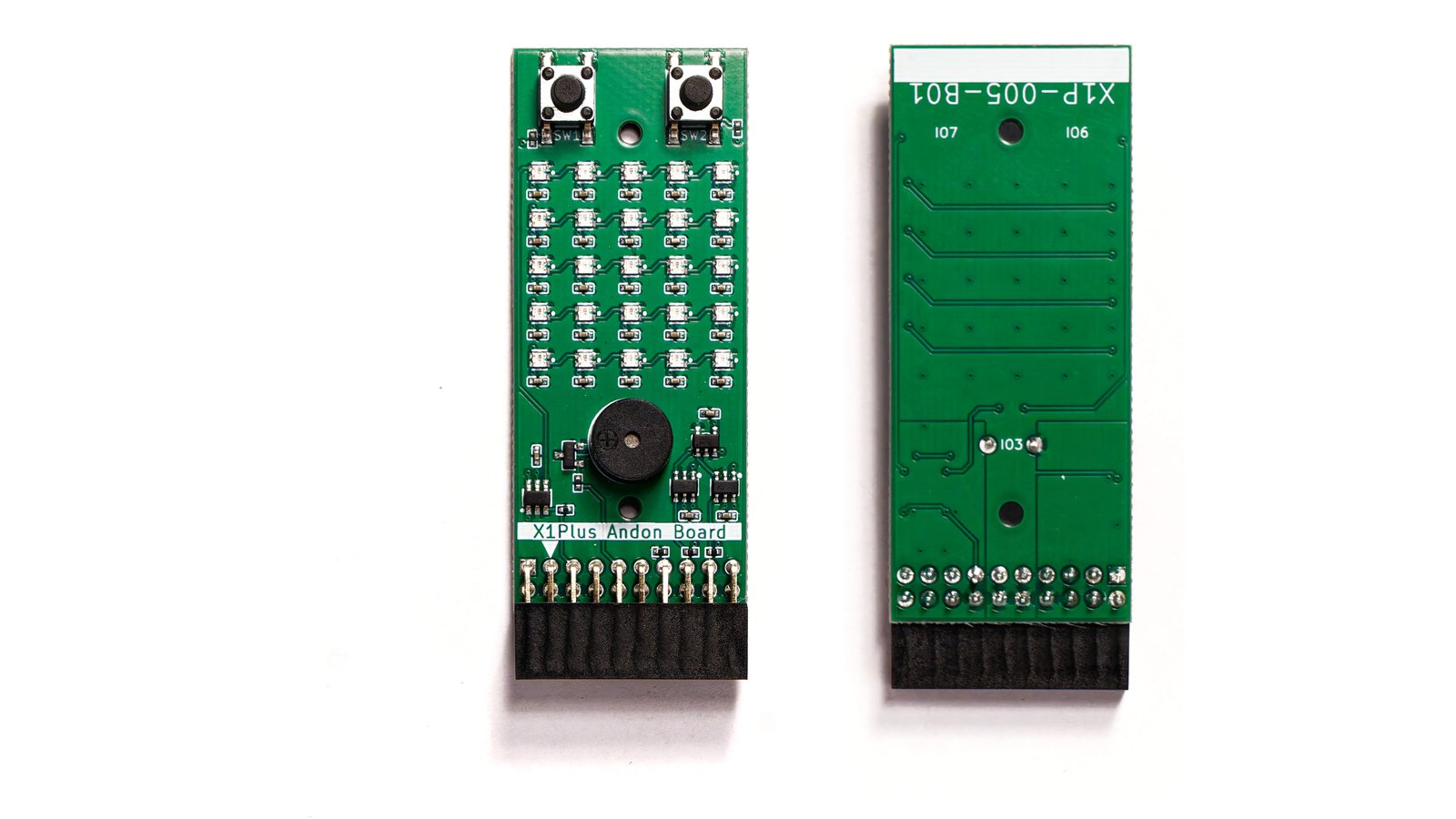
A module for X1Plus Expander with 25 programmable LEDs, a beeper, and two buttons. Can be programmed to display printer status. Requires X1Plus Expander
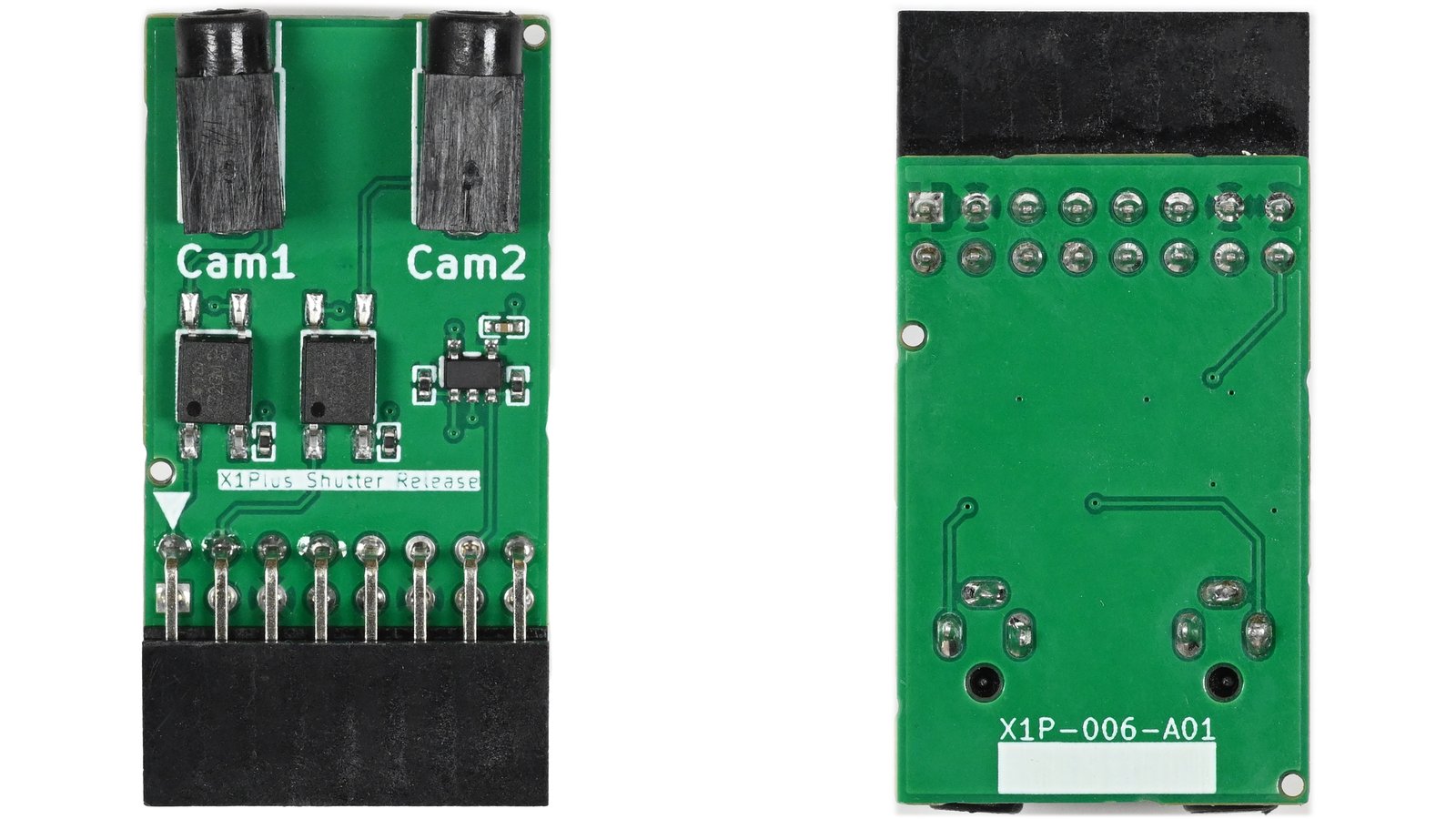
A module for X1Plus Expander with two 2.5-mm TRS jacks that can drive common DSLR and mirrorless camera shutter releases. Requires X1Plus Expander
From the Adafruit NeoPixel LED Strips project.
A 0.5-meter Adafruit NeoPixel LED strip, at 60 LEDs per meter, with a 3-pin, 2-mm JST PH connector
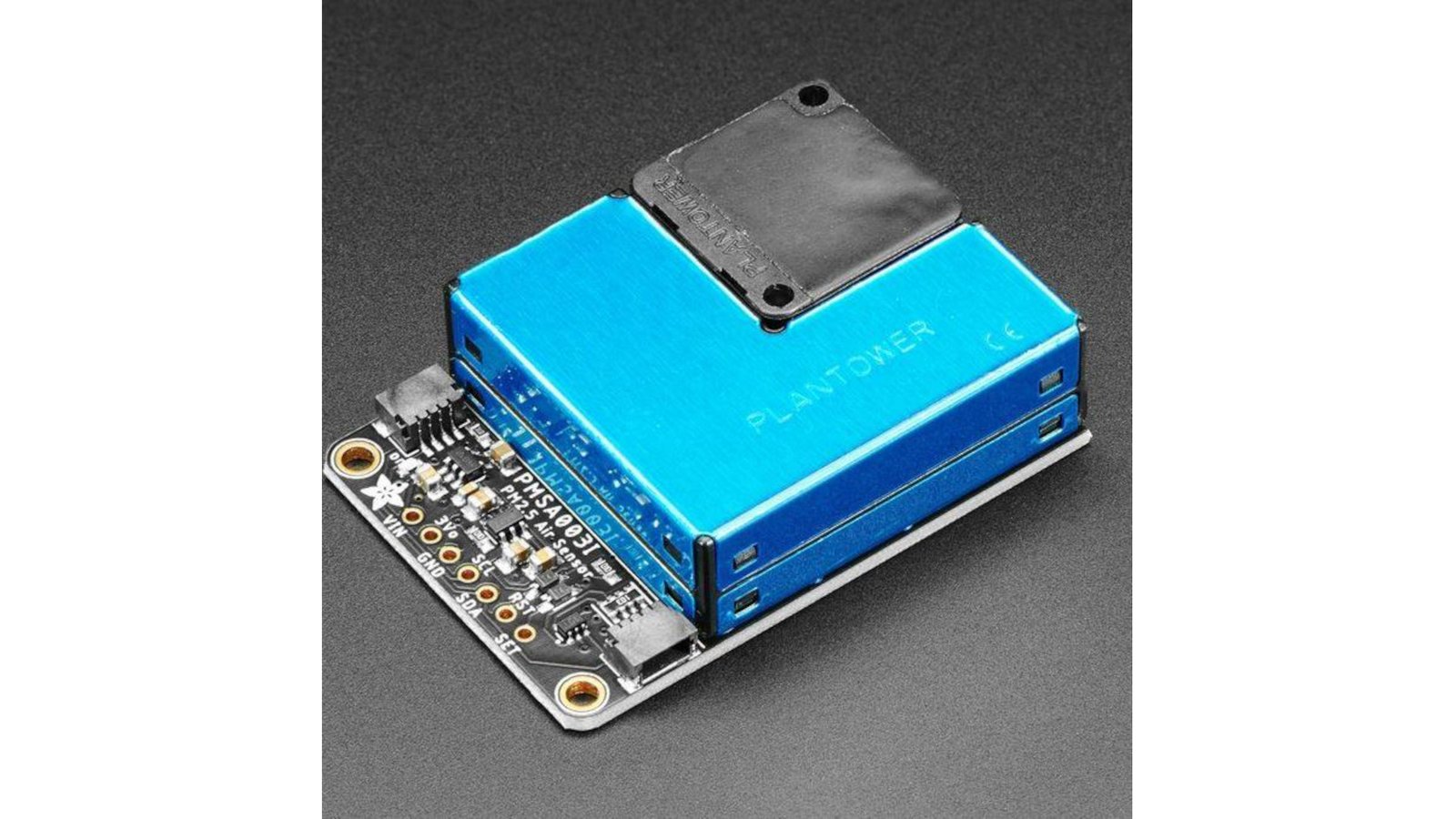
From the Adafruit Air Quality Sensors project.
Adafruit PMSA003I Air Quality Breakout - STEMMA QT / Qwiic
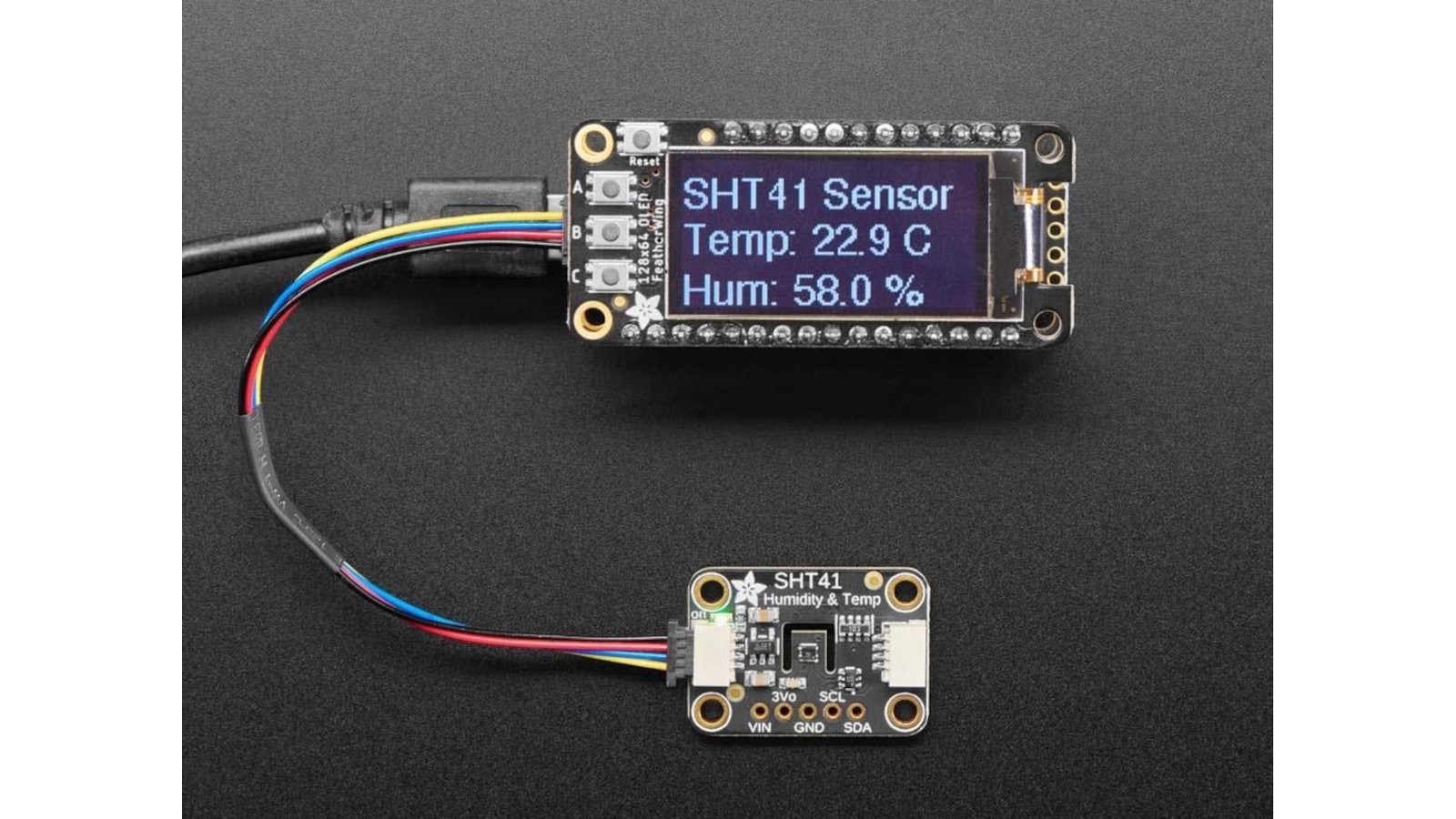
From the Adafruit Temperature Sensors project.
Adafruit Sensirion SHT41 Temperature & Humidity Sensor - STEMMA QT / Qwiic
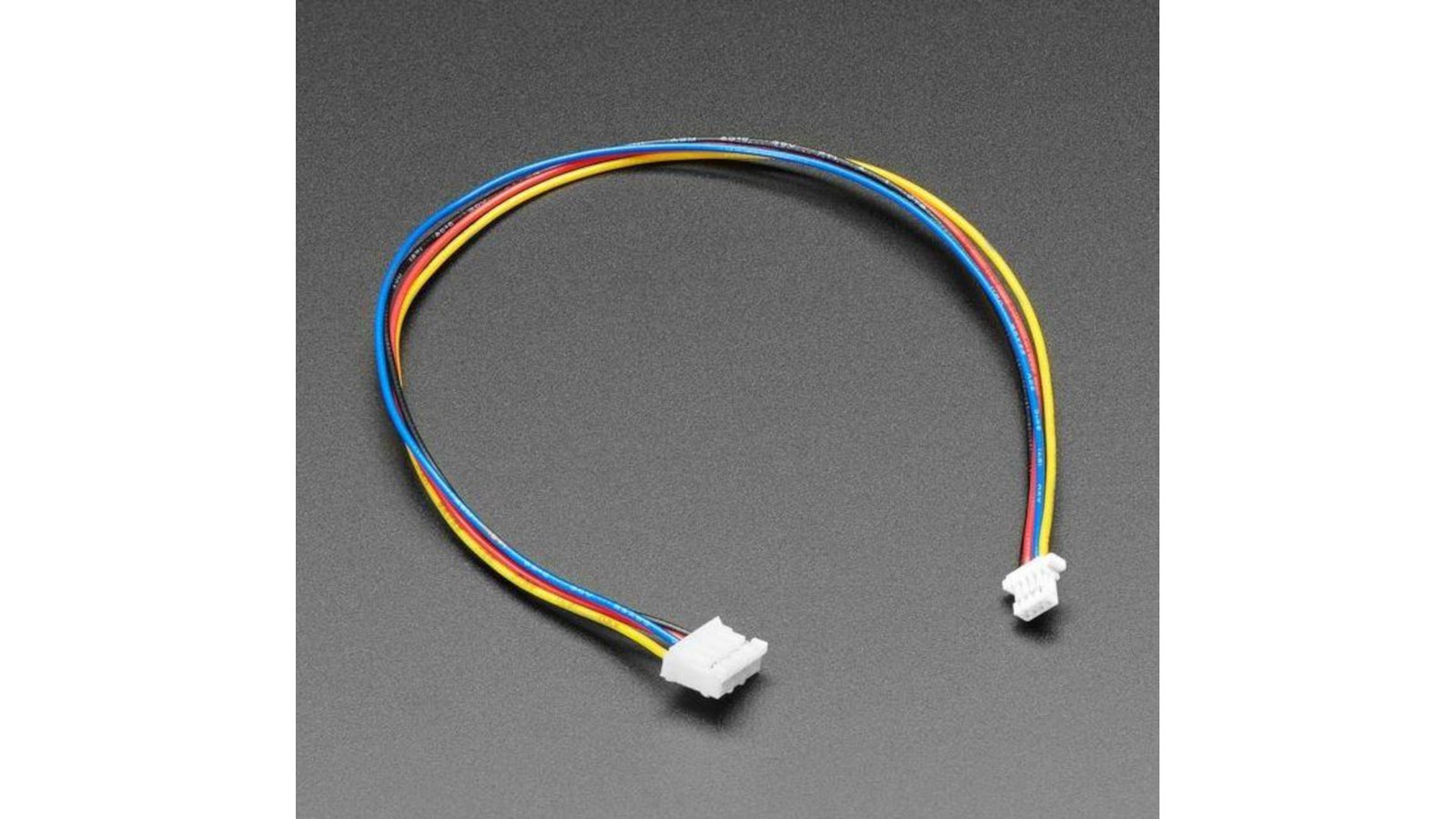
From the Adafruit Cables project.
A 200-mm Adafruit STEMMA to QT / Qwiic (4-pin JST PH to JST SH) Cable

· accelerated.tech · accelerated-tech
We've been helping other companies build and commercialize their own hardware products for seven years, and all the while, we've been doing our own open source work. We're excited to get to use the knowledge we've accumulated to build the things that we've wanted to have in our own labs, and give as many people access to them as possible!